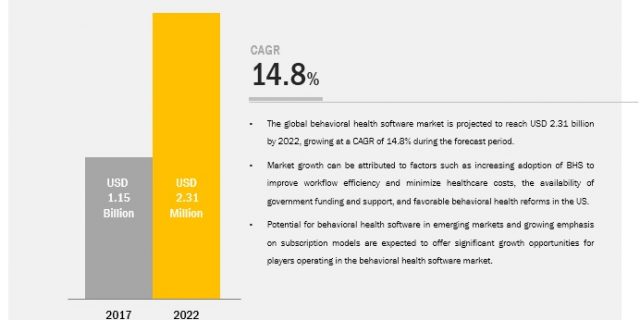
Increasing adoption of behavior health software, availability of government funding, government initiatives to encourage EHR adoption in behavioral health organizations, favorable behavioral health reforms in the US, and high demand for mental health services amidst provider shortage are the major factors driving the growth of this market.
The global behavioral health software market is expected to reach USD 2.31 Billion by 2022 from USD 1.15 Billion in 2017, at a CAGR of 14.8%.
This report segments the behavioral health software market into component, delivery model, functionality, end user, and region. Based on component, the market is segmented into software and support services. The support services segment is expected to account for the largest share of the market in 2017. The recurring requirement of support services (such as for software upgrades and maintenance) is the major factor supporting its growth.
Based on delivery model, the mental health software market is segmented into ownership models and subscription models. The subscription models segment is expected to account for the largest share of the market in 2017. The growth of this segment can be attributed to its advantages such as cost-effectiveness, interoperability, and flexibility.
Download PDF Brochure – https://www.marketsandmarkets.com/pdfdownloadNew.asp?id=45953340
Based on functionality, the mental health software market is segmented into clinical, financial, and administrative functionalities. The clinical functionality segment is expected to account for the largest share of the market in 2017 and is expected to register the highest CAGR during the forecast period. High growth in the clinical functionality segment is attributed to the increasing government initiatives to boost adoption of this software by clinicians to provide quality care to their patients at lower costs.
Based on the end user, the behavioral health software market is segmented into providers, payers, and patients. The patients segment is expected to register the highest CAGR during the forecast period. The large number of patients using behavioral health solutions in their homes or offices for better self-care is the key factor driving the growth of the market for the patients segment.
In 2017, North America is expected to dominate the mental health software market, followed by Europe. The high growth of the North American market is attributed to factors such as increasing behavioral health reforms and the availability of government funding for expanding behavioral health services in the region.
Request for Sample Pages – https://www.marketsandmarkets.com/requestsampleNew.asp?id=45953340
While North America is expected to dominate the mental health software market in 2017, Europe is expected to register the highest CAGR during the forecast period. The high growth in this regional segment is attributed to growing incidence of mental disorders, government initiatives for increasing awareness about mental disorders, and the improving accessibility of behavioral healthcare.
While the behavioral health software market presents significant growth opportunities, market growth may be limited to a certain extent due to the data privacy concerns and shortage of IT-knowledgeable personnel. The market is highly competitive with several big and small players. Prominent players in the Behavioral Health Software Market include Advanced Data Systems (US), AdvancedMD (US), Cerner (US), Compulink (US), Core Solutions (US), Credible Behavioral Health (US), ICANotes (US), InSync Healthcare Solutions (US), iSalus Healthcare (US), Kareo (US), Meditab Software (US), Mentegram (US), Mindlinc (US), Netsmart (US), Nextgen Healthcare (US), and NextStep Solutions (US).
Speak to our expert on Behavioral/Mental Health Software Market – https://www.marketsandmarkets.com/speaktoanalystNew.asp?id=45953340


